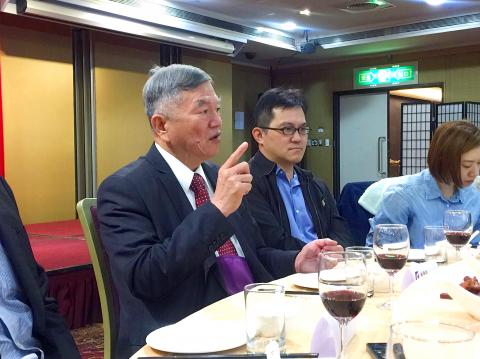The Fair Trade Commission (FTC) yesterday approved Qualcomm Inc’s application to pay a NT$23.4 billion (US$798.6 million) fine for breaching the nation’s antitrust regulations in 60 installments.
The US company would pay about NT$390 million in each installment, with the first installment due at the end of this month, the commission said.
The payment plan was approved out of consideration for Qualcomm’s need to reserve enough funds to sustain its operations, and because the penalty is the largest since the FTC’s inception in 1992, the commission said.

Photo: Lin Chin-hua, Taipei Times
Qualcomm has also backed its promise to pay the fine with promissory notes, the commission added.
The massive fine was handed to Qualcomm in October last year following a two-year investigation by the commission, which resulted in a ruling that the company had hampered market competition by using its position as the world’s largest handset chip designer to manipulate prices.
Handsets are one of the most important aspects of the nation’s export-oriented technology sector and Qualcomm’s actions had affected the entire supply chain, the commission said.
In particular, Qualcomm had leveraged its patent portfolio in radio communication technology standards to pressure local suppliers, who were often forced into unfavorable licensing deals, the commission said.
Qualcomm holds key patents in all major networking standards, including code-division multiple access, wideband code division multiple access and long-term evolution.
The commission estimated that during the seven years of unfair practices between 2005 and 2015, local suppliers had paid about NT$400 billion in licensing fees and purchased US$30 billion worth of baseband radio processors from Qualcomm.
The Ministry of Economic Affairs would not comment on the Qualcomm case, as it respects the commission’s decision, Minister of Economic Affairs Shen Jong-chin (沈榮津) said yesterday.
“To maintain the nation’s economic growth, industry development cannot be halted by fair-trade measures,” Shen told reporters ahead of the FTC’s approval of Qualcomm’s installment payment plan.
The ministry wants to maintain a close relationship with Qualcomm in terms of 5G technology development in Taiwan, he said.
Separately, the EU yesterday hit Qualcomm with an antitrust fine of 997 million euros (US$1.2 billion) for paying Apple Inc to exclusively use its chips in iPhones and iPads.
EU Commissioner for Competition Margrethe Vestager said that by striking the agreement with Apple in 2011, Qualcomm had “abused its market dominance” to unfairly shut out rival chipmakers such as Intel Corp, thus denying choice to consumers.
“Between 2011 and 2016, Qualcomm paid billions of US dollars to a key customer, Apple, and the payment was to prevent Apple to buy from rivals,” Vestager said.
“This meant that no rival could effectively challenge Qualcomm in this market, no matter how good their products were,” she added.
The Danish commissioner said that Qualcomm had “denied consumers and other companies more choice and innovation.”
Additional reporting by Lauly Li and AFP

FALSE DOCUMENTS? Actor William Liao said he was ‘voluntarily cooperating’ with police after a suspect was accused of helping to produce false medical certificates Police yesterday questioned at least six entertainers amid allegations of evasion of compulsory military service, with Lee Chuan (李銓), a member of boy band Choc7 (超克7), and actor Daniel Chen (陳大天) among those summoned. The New Taipei City District Prosecutors’ Office in January launched an investigation into a group that was allegedly helping men dodge compulsory military service using falsified medical documents. Actor Darren Wang (王大陸) has been accused of being one of the group’s clients. As the investigation expanded, investigators at New Taipei City’s Yonghe Precinct said that other entertainers commissioned the group to obtain false documents. The main suspect, a man surnamed

DEMOGRAPHICS: Robotics is the most promising answer to looming labor woes, the long-term care system and national contingency response, an official said Taiwan is to launch a five-year plan to boost the robotics industry in a bid to address labor shortages stemming from a declining and aging population, the Executive Yuan said yesterday. The government approved the initiative, dubbed the Smart Robotics Industry Promotion Plan, via executive order, senior officials told a post-Cabinet meeting news conference in Taipei. Taiwan’s population decline would strain the economy and the nation’s ability to care for vulnerable and elderly people, said Peter Hong (洪樂文), who heads the National Science and Technology Council’s (NSTC) Department of Engineering and Technologies. Projections show that the proportion of Taiwanese 65 or older would

The government is considering polices to increase rental subsidies for people living in social housing who get married and have children, Premier Cho Jung-tai (卓榮泰) said yesterday. During an interview with the Plain Law Movement (法律白話文) podcast, Cho said that housing prices cannot be brought down overnight without affecting banks and mortgages. Therefore, the government is focusing on providing more aid for young people by taking 3 to 5 percent of urban renewal projects and zone expropriations and using that land for social housing, he said. Single people living in social housing who get married and become parents could obtain 50 percent more

Democracies must remain united in the face of a shifting geopolitical landscape, former president Tsai Ing-wen (蔡英文) told the Copenhagen Democracy Summit on Tuesday, while emphasizing the importance of Taiwan’s security to the world. “Taiwan’s security is essential to regional stability and to defending democratic values amid mounting authoritarianism,” Tsai said at the annual forum in the Danish capital. Noting a “new geopolitical landscape” in which global trade and security face “uncertainty and unpredictability,” Tsai said that democracies must remain united and be more committed to building up resilience together in the face of challenges. Resilience “allows us to absorb shocks, adapt under